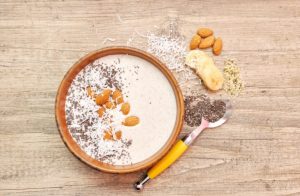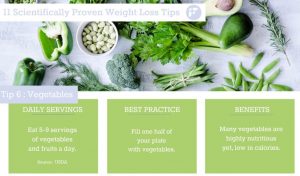Different foods go through different metabolic pathways in your body. They can have vastly different effects on your hunger, hormones and the number of calories you burn
Vegetables help keep you full for longer. The fiber and water in vegetables fill you up way more efficiently than eating processed carbs that are deficient in fiber.
Yes, you can definitely lose weight from eating only vegetables for a month or with any other meal plan that restricts your calories. But a diet that is healthy in the long run requires sufficient calories, protein, and fat that you might be cutting out of your diet.
Vegetables and fruits have a lot of fiber and are full of nutrition like essential minerals and vitamins that may help your body improve metabolism and subsequently burn belly fat.
To lose weight, you must eat fewer calories than your body uses
They can substitute for starchy root veggies like potato or starchy grains like rice or couscous so you eat less. And you can add them to any grains you cook to create a half-grain, half-veggie dish such as green fried rice.
That said, eating breakfast can give a person energy for the day. This may reduce the risk of overeating and, in this way, support weight loss efforts.
According to the Robert Wood Johnson Foundation and the Trust for America’s Health, the obesity rate in America is expected to reach 44% by 2030.
 These fat burning foods will not only enhance your metabolism but will make you keep full for a longer period of time preventing sudden hunger cravings.
These fat burning foods will not only enhance your metabolism but will make you keep full for a longer period of time preventing sudden hunger cravings.
Researchers analyzed previous research on weight loss and increased fruit and vegetable intake, which included data on more than 1,200 people.
Some fruits and vegetables that are very low in energy density are tomatoes, cantaloupe, strawberries, and broccoli.
Veggies Tend To Be Weight-loss Friendly
Why? Most are low in calories and all offer filling fiber, which helps to tide you over and decrease those urges to snack.
The Laval study emphasized spicy peppers specifically because the capsaicin-rich vegetables have been shown to both boosts the metabolism and prevent future overeating.
 But even with all these benefits, all this glory, and the diet-friendly fiber, vitamins, minerals, antioxidants, and phytochemicals, sometimes, we just don’t want to eat them.
But even with all these benefits, all this glory, and the diet-friendly fiber, vitamins, minerals, antioxidants, and phytochemicals, sometimes, we just don’t want to eat them.
If the food contains the word “veggie,” it’s not automatically healthy. Don’t let marketing gimmicks fool you: The majority of foods are mislabeled and not as healthy as they claim to be, veggie chips included, says Amidor
Eating more vegetables can help you lose weight and, ideally, you should be eating them with every meal and snack. We’ve rounded up 16 veggie snacks, all approved by dietitians, to make that a little easier.
Vegetables Are Rich In Antioxidants
In addition to helping you feel full with few calories, vegetables also help promote weight loss by being rich in many powerful antioxidants, vitamins, minerals, and phytochemicals.
Vegetables are full of antioxidants, AND they help you to lose weight? Vegetables are definitely among our favorite fat-fighting foods.
If a person consumes some or all of these foods regularly, they may increase their antioxidant levels, potentially helping them prevent the damage that doctors associate with oxidative stress
Almost all fruit produced the same results, while vegetables containing lots of fiber and low carbohydrates (like broccoli and Brussels sprouts) led to greater weight loss, which Bertoia says is because they make you feel full.



